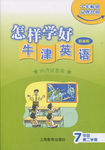题目内容
The hospital's patients , mainly_______road accident victims, have been recovered from their injuries
A. made up of B. made of C. made from D. consisted of
A
解析:
be made up of的意思为 “由……组成”, 本题made up of…是过去分词作后置定语, 相当于非限制性定语从句 which are made up of…。B、C两项意思为“由……制成”; D项consist of sth意思为 “组成”, 用主动形式, 此处应改为表主动的consisting of。

 怎样学好牛津英语系列答案
怎样学好牛津英语系列答案Our listener question this week comes from Abdullahi Farah, who wants to know about the life and work of Doctor Benjamin Carson.
Doctor Carson is an internationally recognized doctor at Johns Hopkins Hospital in Baltimore, Maryland. He has been the director of Pediatric Neurosurgery at the hospital for twenty-five years. At the age of thirty-three, he became one of the youngest doctors in the United States to hold that position. And he was the first African-American to have that position at Johns Hopkins Hospital.
Ben Carson is known for his work as a brain surgeon for children. For example, in nineteen eighty-seven, he led a team of seventy doctors and nurses in an operation to separate two babies joined at the head. Earlier attempts by other surgeons on other babies had failed. Doctor Carson successfully performed the operation. Both babies were able to survive independently.
Doctor Carson has written four books. His first book, "Gifted Hands," tells the story of his life. Benjamin Carson was born in nineteen fifty-one in Detroit, Michigan.
As a boy, Ben was not a good student. In fact, he was the worst in his class. When his mother learned of his failing grades she asked her sons to read two library books every week. She limited the amount of time they watched television. And she told them to respect every person.
Ben Carson soon became the top student in his class. He went on to study at Yale University, one of the best universities in the country, and later to medical school at the University of Michigan.
Doctor Carson has received many awards and honors. Last year he received the nation's highest civilian honor. Former President George W. Bush presented Benjamin Carson with the Presidential Medal of Freedom at a ceremony at the White House.
1.The passage is probably taken from _____.
|
A.a radio |
B.a magazine |
C.TV |
D.a paper |
2.What does the word “surgeons” in paragraph 3 mean?
|
A.nurses |
B.doctors |
C.hospitals |
D.points |
3.Benjamin Carson’s change in study was largely because of ______
|
A.his hard work |
B.his teacher |
|
C.his mother |
D.his father |
4.What’s the aim to write the passage?
|
A.To call on us to learn from Benjamin Carson. |
|
B.To praise Benjamin Carson for his achievements. |
|
C.To show us how Benjamin Carson succeeded |
|
D.To introduce Benjamin Carson’s life and work |
